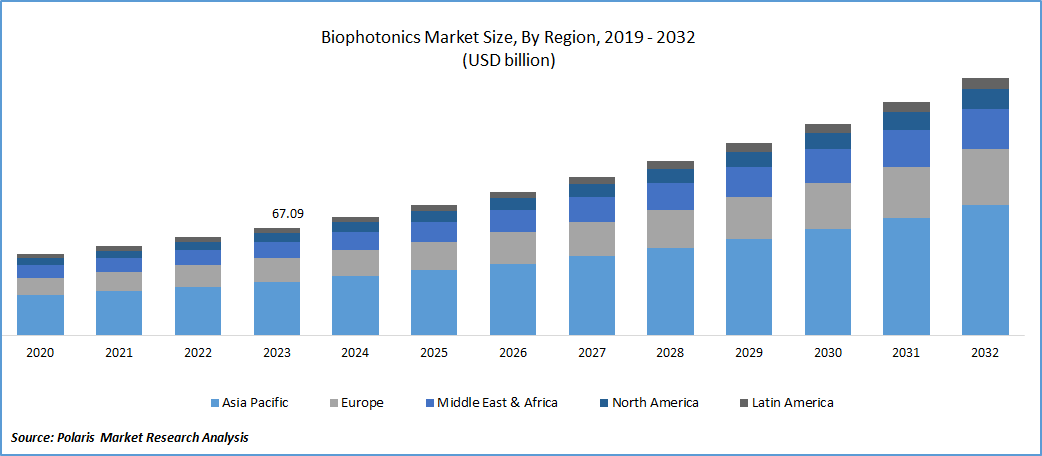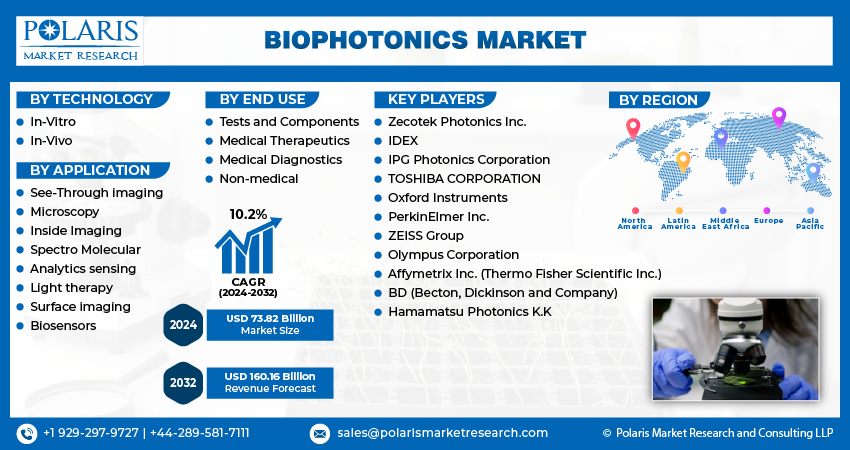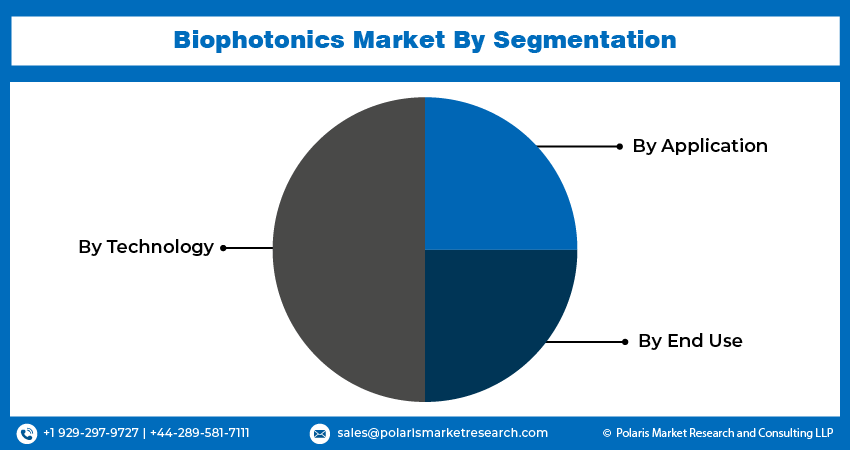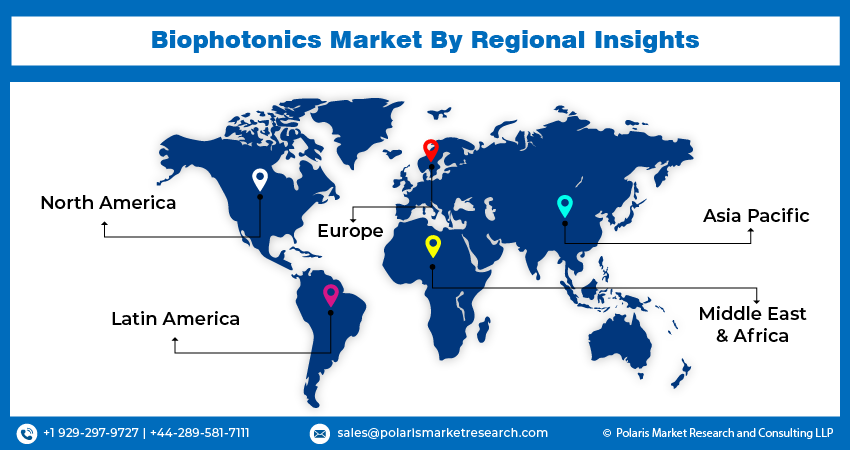
Biophotonics Market Share, Size, Trends, Industry Analysis Report
By Technology (In-Vitro, In-Vivo), By Application, By End-use, By Region, And Segment Forecasts, 2024 - 2032
- Published Date:Jan-2024
- Pages: 116
- Format: PDF
- Report ID: PM4232
- Base Year: 2023
- Historical Data: 2019-2022
Report Outlook
The global Biophotonics market was valued at USD 67.09 billion in 2023 and is expected to grow at a CAGR of 10.2% during the forecast period.
Key factors responsible for the market growth include rising elderly population, increased prevalence of chronic illnesses, government initiatives to enhance healthcare, integration of IT in healthcare applications, and the incorporation of photonic components in existing healthcare devices for improved accuracy and sensitivity. Additionally, the management of environmental factors, including water and food sources, is anticipated to further drive market growth in the coming years.

To Understand More About this Research: Request a Free Sample Report
Contemporary biotechnology heavily relies on molecular biology knowledge, utilizing optical techniques to extract information regarding DNA, mRNA, or protein content. These methods often involve the use of fluorescent-labeled antibodies or similar markers, as seen in technologies like flow cytometry, confocal fluorescence microscopy, and well-known platforms like GeneChips. By enhancing wavelength selectivity in both the light source and detection methods, it's possible to monitor a significantly larger number of biological components, potentially increasing it by a factor of 10 or more. The ultimate objective is to create a system capable of determining the complete genetic content (DNA), the translated section (mRNA), or the transcribed material (proteins) within a specific sample or population.
Fluorescence techniques like fluorescence-lifetime imaging microscopy (FLIM) are becoming more prevalent in cell biology for observing processes like phase separation, conformational changes, and protein interactions. However, obtaining precise and consistent results from these tools has required specialized expertise, hindering their widespread use.
With the vast amount of clinical and biological data being generated rapidly, big data technologies and machine learning have become integral in biomedical and healthcare research. Traditional analytical methods in bio-photonics often only scratch the surface of these extensive datasets, resulting in the loss of valuable information. Integrating technologies like machine learning and big data enables a comprehensive analysis, extracting more meaningful insights from these datasets.
Machine learning techniques have revolutionized the detection of subtle signals and particles in bio-photonics. While researchers capture high-content images indicating the location of moving particles, some images suffer from low contrast and noisy backgrounds, making manual particle counting challenging. To address this, researchers employ machine learning, training computers to accurately distinguish individual particles in images. This detailed analysis and data extraction through machine learning have the potential to significantly enhance the use of bio-photonics.
The intricate nature of bio-photonics technology could hinder its broad implementation. Moreover, the considerable expenses linked with instruments based on bio-photonics create a hurdle for market expansion. Additionally, the gradual pace of commercialization and reluctance to embrace new treatment methods pose challenges to the market's growth.

Growth Drivers
Technological Advancements
The adoption of technological advancements in the medical field is poised to boost market demand soon. Additionally, the rise of nanotechnology and the growing need for home-based Point-of-Care (POC) devices are anticipated to drive market growth. Advancements in optical technologies within the aerospace and telecom sectors, combined with funding from both private and government sources for research and development, are also expected to positively influence market expansion.
Biophotonics Market involves the development of optical technologies that facilitate the interaction of light or photons with biological organisms, molecules, & tissues. Photo-mechanics is applied in dentistry to analyze strain gradients. Spectroscopy is instrumental in studying the interaction between radiated energy and matter, while these sensors are utilized for remote assessment of chemical and physical parameters.
Report Segmentation
The market is primarily segmented based on technology, application, end use, and region.
|
By Technology |
By Application |
By End Use |
By Region |
|
|
|
|
To Understand the Scope of this Report: Speak to Analyst
By Technology Analysis
In-vitro segment held the largest share
In-vitro segment dominated the market. This is due to the rising requirement for sophisticated diagnostic and imaging technologies in healthcare. Biophotonics plays a vital role in offering non-invasive and label-free methods for analyzing biological samples like cells and tissues outside the living organism. The increasing demand for precise and effective in-vitro diagnostics has driven the utilization of bio-photonics in this sector.
In-vivo segment will grow at significant pace. This growth is propelled by the increasing need for non-invasive and real-time imaging methods in medical diagnostics. Biophotonics-based in-vivo imaging technologies provide the capacity to observe cellular and molecular processes within living organisms without the need for invasive techniques or sample removal. The capability to monitor intricate biological processes non-invasively and in real-time is fueling the expansion of the market.
By Application Analysis
Analytics sensing segment accounted for the largest market share in 2022
Analytics sensing segment held the largest share. The escalating need for POCT & portable devices is driving the expansion of this segment. Biophotonics-driven analytics sensing technologies can be downscaled, incorporated into portable devices, and deliver swift and precise diagnostic outcomes at the point of care.
Microscopy segment will exhibit robust growth rate. Progress in automation and the incorporation of microscopy systems have been key drivers for market expansion. These technological strides not only improve microscopy capabilities but also enhance user-friendliness, data analysis, and overall workflow efficiency. The market is fueled by the increasing demand for integrated and automated microscopy solutions.
Significant advancements in see-through imaging techniques, especially in medical diagnostics and drug discovery, have marked the past decade. See-through imaging has emerged as a crucial tool for both in-vitro and in-vivo imaging, becoming integral to biomedical research. Additionally, the growth of the surface imaging market is strongly influenced by the widespread acceptance of minimally invasive procedures for both diagnosis and treatment, with endoscopy playing a pivotal role in this trend.
By End Use Analysis
Non-medical segment accounted for the largest market share in 2022
Non-medical segment will exhibit robust growth rate. This surge is attributed to its advanced environmental screening and monitoring capabilities. Increasing research on pathogen exposures in agricultural food, continuous blood monitoring, and prevention of unauthorized data visualization are anticipated to significantly boost the segment.

Regional Insights
North America accounted for the largest share of global market in 2022
North America dominated the market. This was driven by heightened research and development endeavors, augmented investments in the healthcare sector, and the presence of top-notch infrastructure. The region's aging population and the rising prevalence of cancer patients are anticipated to propel further market expansion in the coming years. Noteworthy technological progress has amplified the significance of optical techniques in addressing medical and life science challenges. Optical technology finds diverse applications, encompassing clinical patient treatments and molecular-level investigations
APAC will grow at the substantial pace. The improvement in healthcare infrastructure includes the incorporation of cutting-edge technologies, among which bio-photonics plays a vital role. Advanced medical facilities are increasingly adopting bio-photonics-based techniques for diagnostics, imaging, and research, driving the market's expansion. Additionally, key market players, including both local companies and international organizations, are investing heavily in the region. These investments are directed towards research, development, and the commercialization of bio-photonics technologies.

Key Market Players & Competitive Insights
The market is fiercely competitive, prompting companies to implement strategies such as launching new products, acquiring businesses, and forming collaborations to expand their global presence.
Some of the major players operating in the global market include:
- Affymetrix Inc. (Thermo Fisher Scientific Inc.)
- BD (Becton, Dickinson and Company)
- ZEISS Group
- Olympus Corporation
- Hamamatsu Photonics K.K
- Zecotek Photonics Inc.
- IDEX
- IPG Photonics Corporation
- TOSHIBA CORPORATION
- Oxford Instruments
- PerkinElmer Inc.
Recent Developments
- In September 2023, world renowned researcher, Prof Stefan Andersson-Engels has secured funding of around EUR 5.3 Mn from the Science Foundation Ireland. This will used to diagnosis of diseases like inflammatory bowel diseases and specific types of cancer.
- In April 2021, The Indian government initiated the Production Linked Incentive Scheme (PLI 2.0) with the aim of enhancing India's manufacturing capacity by encouraging increased investments and output in the in vitro diagnostics sector.
- In April 2021, CellaVision recently secured rights of the Clear Bridge's portfolio on the Fourier Ptychographic Microscopy, a cutting-edge microscopy solution. This will grant access & control over innovative technologies in the field.
Biophotonics Market Report Scope
|
Report Attributes |
Details |
|
Market size value in 2024 |
USD 73.82 billion |
|
Revenue forecast in 2032 |
USD 160.16 billion |
|
CAGR |
10.2% from 2024 – 2032 |
|
Base year |
2023 |
|
Historical data |
2020 – 2022 |
|
Forecast period |
2024 – 2032 |
|
Quantitative units |
Revenue in USD million/billion and CAGR from 2024 to 2032 |
|
Segments covered |
By technology, By application, By end use, By Region |
|
Regional scope |
North America, Europe, Asia Pacific, Latin America, Middle East & Africa |
|
Customization |
Report customization as per your requirements with respect to countries, region and segmentation. |
Explore the market dynamics of the 2024 Biophotonics Market share, size, and revenue growth rate, meticulously examined in the insightful reports crafted by Polaris Market Rersearch Industry Reports. The analysis of Biophotonics Market extends to a comprehensive market forecast up to 2032, coupled with a retrospective examination. Avail yourself of a complimentary PDF download to sample this in-depth industry analysis.
Browse Our Top Selling Reports
Engine Bearings Market Size, Share 2024 Research Report
Biogas Market Size, Share 2024 Research Report
Microgrid Market Size, Share 2024 Research Report
Ergonomic Chair Market Size, Share 2024 Research Report
Higher Education Technology Market Size, Share 2024 Research Report
FAQ's
Affymetrix, BD, ZEISS, Olympus, Hamamatsu Photonics are the key companies in Biophotonics Market.
The global Biophotonics market and is expected to grow at a CAGR of 10.2% during the forecast period.
Technology, application, end use, and region are the key segments covered.
Technological Advancements are the key driving factors in Biophotonics Market.
The global Biophotonics market size is expected to reach USD 160.16 billion by 2032
